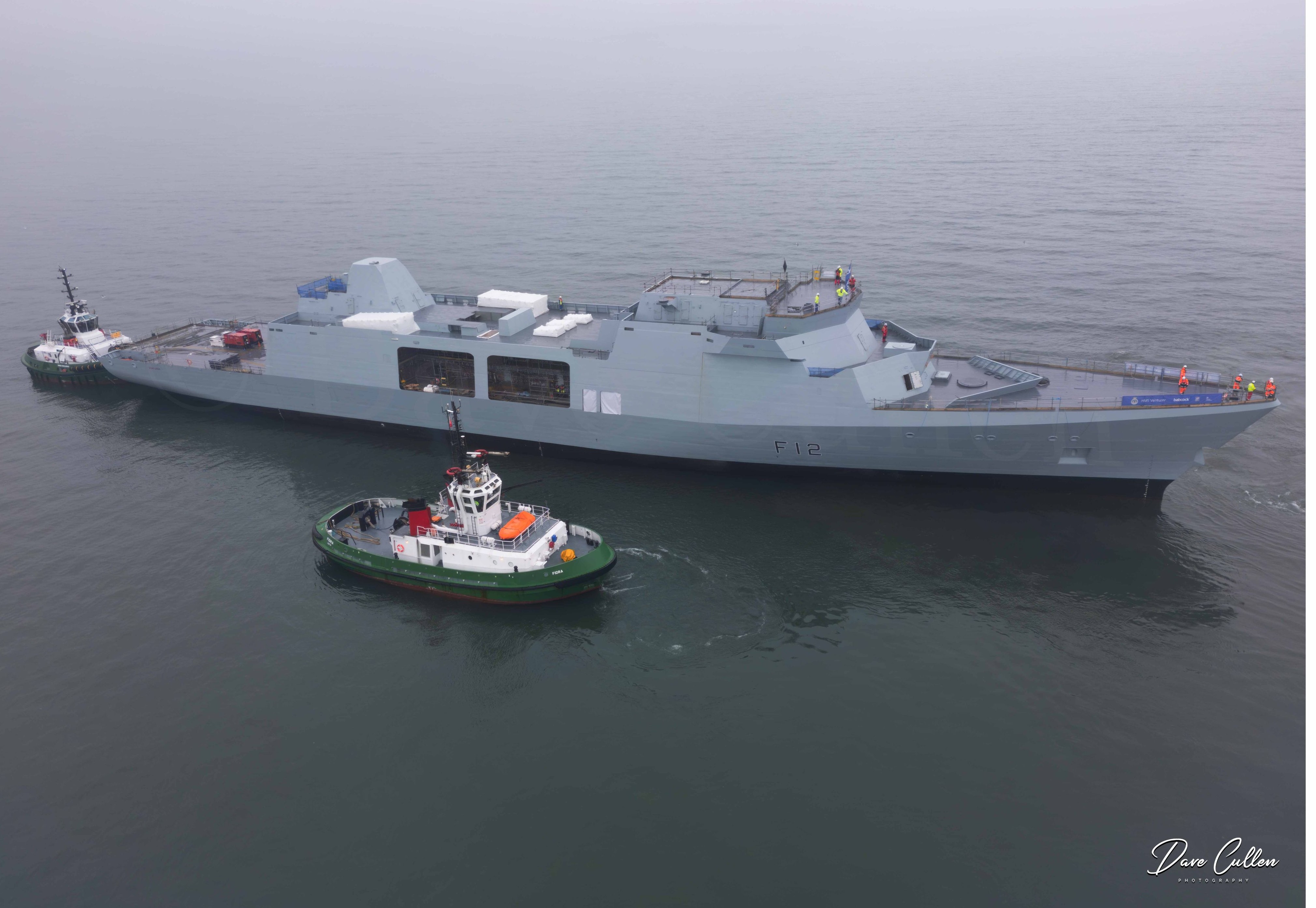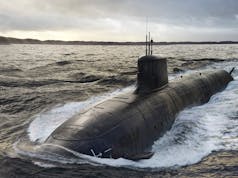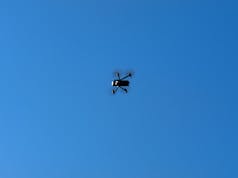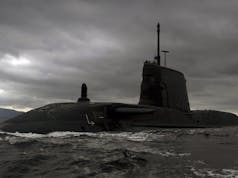During a Christmas lecture at the Royal United Services Institute, Air Chief Marshal Sir Stuart Peach warned against Russian disinformation campaigns as well as disruption of fibre optic cables.
Undersea cables come ashore in just a few remote, coastal locations. These landing sites are critical national infrastructure but often have minimal protection, making them vulnerable to terrorism or state attack. A foiled Al-Qaeda plot to destroy a key London internet exchange in 2007 illustrates the credibility of the threat.
“There is a new risk to our life, which is the vulnerability of the cables that criss-cross the seas. Imagine a scenario where those cables are cut or disrupted, which would immediately and potentially catastrophically affect both our economy and other ways of living. Therefore we must continue to develop our maritime forces, with our allies, to match Russian fleet modernisation.
In eastern Ukraine, two brigades of Ukrainian armed forces were wiped out in a few minutes by Russian modernised land-based systems. In the air, UK Typhoons have intercepted Russia aircraft operating very close to UK airspace, led a deployment to the Black Sea coast to provide air policing and air support to Romania and other Nato allies in the region and, flexibly, provided air support to Nato in Estonia.
We are genuinely playing a leading role in Nato and it is essential to our security that we sustain our posture as Russia modernises its forces and flexes its military muscles — not just in Syria — and has a higher risk appetite to achieve its national interest. We need to innovate. We need now to take big bets on what might work. This needs to be done in months and not years.”
Think tank ‘Policy Exchange’ say that 97% of global communications and $10 trillion in daily financial transactions are transmitted not by satellites in the skies, but by cables lying deep beneath the ocean.
“Undersea cables are the indispensable infrastructure of our time, essential to our modern life and digital economy, yet they are inadequately protected and highly vulnerable to attack at sea and on land, from both hostile states and terrorists.”
The report recommends that:
- The next Strategic Defence and Security Review should specifically address threats to Britain’s security from attacks on our undersea cable infrastructure
- The Centre for the Protection of National Infrastructure should quickly review and improve security at UK landing sites where cables come ashore
- Britain and NATO must ensure their maritime resources are adequate to deal with this new threat to our security
- The government should work with private communications companies to install more backup ‘dark cables’ and improve monitoring at sea
- We should follow the example of Australia and New Zealand and establish Cable Protection Zones around our highest value communications corridors
- The UK must lead efforts to develop a new international treaty to protect undersea cables
This report has been endorsed by Admiral James Stavridis, US Navy (Ret), former NATO Supreme Allied Commander; Robert Hannigan, former Security Adviser to the Prime Minister and Director of GCHQ until earlier this year; and General Lord Houghton, former UK Chief of Defence Staff, who stepped down in 2016.












All agreed. Plus have the hulls above and below to interdict any such attempts.
Exactly and the MPAs, seems to be finally be a concentrated effort by the MoD to tell the Government that no longer can they cheat defence out of the cash it needs.
Yep
You mean Facebook & Twitter could disappear overnight?
..the sooner the better.
Even though that might improve productivity after an initial shock if it were only Fb & Tw it’s everything else – everything is connected now.
This is aimed at cabinet secretary doing the review – he might want to invest in cyber but the armed forces are pointing out you need to defend the physical infrastructure with assets. For my two penny worth – as new types of threat emerge you can’t go slicing existing capabilities when clearly that threat still exists. Bottom line defence budget has to increase now by dramatic amount. If they insist on maintaining the over seas aid budget then the entire amphibious capability should be paid out of it. Clear Dual use. It should also pay for royal engineers and they should operate like us one does – almost as a commercial unit – and they should do the rebuild work and get paid out of dfid budget.
Threat multiplied but budget same means something has to give.
Not a terrible dea.
I have to laugh at how the UK treats cyber crime. (In this case the loss of a connection) The Military uses Dii and they use BT (As anybody who has signed the Sy Op will know) Yet BT uses Huawei to supply its broadband equipment : mobile handsets, routers and equipment in telephone exchanges and street cabinets . Huawei is banned in the US India and Australia from going near their telecoms, but in the Uk we don’t mind. A few years back, a message was sent out to all Dii users about hackers and such and that China was the biggest threat and here we are today trying to close a door that we have already opened.
It is a joke, I have no doubt China knows everything it feels it needs to know about the UK. The biggest realistic issue for me is the theft of intellectual that the Chinese steal at will, its a disgrace.
Right.
He’s only now worried about it? The US and Russia have been tapping undersea cables for decades, and I’m sure so has the UK and anyone else with a half-way respectable navy. That any and all of these players could at any time actually snip a cable or three is the epitome of obvious.
Any such action by the Russians would be an act of war. Compromising and denying societies of basic amenities is a criminal act. It’s standard practice to neutralize or compromise your enemies utilities, as early as possible at the commencement of any conflict.
I doubt Russia would directly interrupt the lines of communication in peacetime, to do so would signal an offensive operation was in progress.
It would only be an act of war if they get caught… they could merely say a dragged anchor did it – that happens enough already.
If it were shallow enough for a dragging anchor, the submarine doing the snipping would be aground.
Well, if that is the case we could do likewise, either way, you could only get away with it once. I’m convinced they won’t go anywhere near these lines intentionally to do harm. That said, I’m sure they know exactly where they are, as the West knows where their critical lines are located. To raise this as a potential threat is a deliberate political manoeuvre, in order to make the British public aware of possible future Russian sculdugery.
What is a good idea, however, is a new fleet of medium patrol craft to patrol these critical lines around the clock? Such a fleet would most certainly measure the Russian scope and threat. Sadly, the only way to get the Treasury to consider such a fleet is to go public about the potential risks.
But that’s the point Maurice – if offensive actions were to start you’d sync taking out the comms, a couple of big container ships and key bases with sub launched cruise missiles taking out key military infra.
Our JIT economy would be hobbled in days.
While I agree with the need for defence don’t ignore the irony that we, that is GCHQ and no doubt with co operation from the RN and the USN, have been doing this for years!
Project Ivy Bells in the 80’s attacked Soviet cables in the Sea of Othosk.
If the cables are not physically damaged they can still be tapped, and are.
The Cable Landing Stations are open source info too, and highly vulnerable. I’ve driven into one
without so much as a person on the gate.
I’m sort of Curious on how the Russians are Pulling This One Off, considering Submarine Fiber Optic Cables lie ~8,000-feet of Water. Unless their Hitting the Shore Installation the Fiber Optic Cables are Connected To…
Or somewhere in between? To come ashore they have to get from 8,000 feet below sea level to sea level so presumably there must be intermediate points as they climb upwards that might be easier to attack.
My second thought… Given what a valuable target the cables offer and Russia’s brains and engineering prowess I can easily imagine a project where a remotely controlled unmanned deep-diving mini sub with some sort of attack capabilities (drills, saws, pincers, explosives or whatever the engineers come up with) could be deployed from a sub (or a surface vessel but less easy to do that covertly).
The wreck of the Titanic is at 12,500 feet according to Wikipedia and there have been lots of expeditions since discovery including filming the footage for the James Cameron movie released way back in 1997 so the remote mini sub technology is well established with the exception of the kill-a-cable attack tools and interfacing it’s command and control to a console inside a sub neither of which I would think are massive undertakings.
@ Julian.
Submarine Fiber Optic Cables are Less than 76mm Thick and Not Easy to See Underwater. When Cables were Layed, several “False” construction site were built to Mask the Actual Placement of Cable. If the Russians Already have this Information, what else do they know…